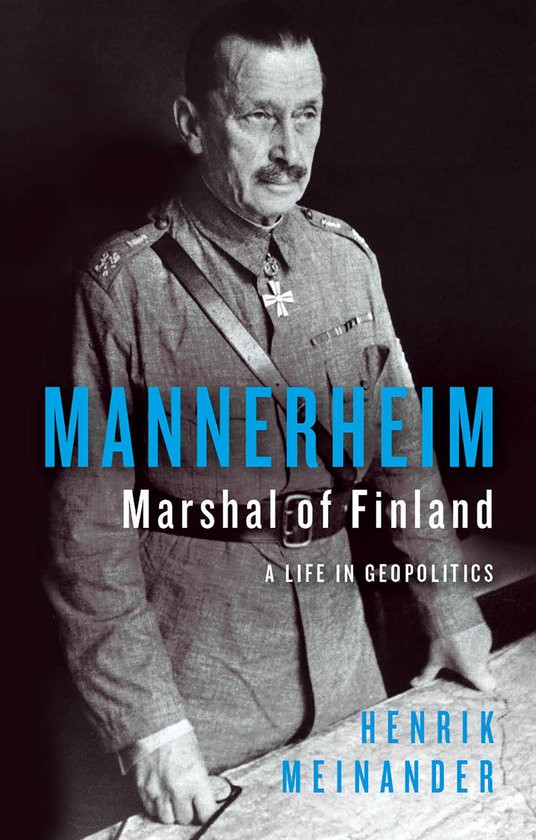| Title: | Mannerheim, Marshal of Finland - A Life in Geopolitics |
| Writer: | Meinander, Henrik |
| Published: | C Hurst & Co Publishers Ltd |
| Published in: | 2023 |
| Pages: | 320 |
| Language: | English |
| ISBN: | 9781787389373 |
| Review: | In 2004, a Finnish television program organized an election for 'the greatest Finn of all time.' The outcome was predetermined: naturally, it was Carl Gustaf Mannerheim (1867-1951), the president and marshal who played a crucial role in Finland's independence from Russia after World War I and then led this small nation through World War II. What Prince William of Orange is to the Netherlands, Baron Gustaf Mannerheim is to Finland. The memory of the marshal has gradually taken on mythical proportions. In Finland itself, an immense number of publications and biographies about Mannerheim have naturally been released. Mannerheim himself also worked on his memoirs, although he passed away (in 1951) shortly before they were to be published. Fortunately, there is also significant interest in the figure of Mannerheim beyond the Finnish-speaking world. Notably, there is the extensive biography by the Swedish historian and former diplomat Stig Jägerskiöld (the first part of which was published in 1970) and the more recent work (from 2009) by the British author Jonathan Clements, who has previously published biographies of Mao and Confusius. Now, there is a new and concise, readable biography authored by Finnish but Swedish-speaking historian Henrik Meinander. In the intriguing final chapter of this new Mannerheim biography, Meinander discusses the historiography surrounding the figure of Mannerheim, suggesting that foreign historians may have been better equipped than the Finns themselves to assess Mannerheim's actions with a balanced and objective perspective. Furthermore, this balanced and objective biography, authored by a Finnish writer, is free from apologetic tendencies. Outside of Finland, Gustav Mannerheim gained recognition primarily as the capable leader of a small, fearless nation that bravely resisted the overwhelming force of the Red Army in 1939. The Finnish support for the German invasion of Russia two years later was understandable for this reason, even though the images of Hitler and Mannerheim together always remained uncomfortable, especially for the residents of countries that endured a distressing period of German occupation. Meinander's biography provides a clear overview of his exceptionally intriguing life. It is scarcely known outside Finland that the marshal who became a symbol of Finland's independence spoke better Russian than Finnish and served for decades as an officer in the Tsarist Russian army. Mannerheim had even been a part of the honor guard at the coronation of Nicholas II in 1896, who would ultimately become the last Tsar. During the turbulent years following the Russian Revolution, Mannerheim was not among the strongest proponents of Finland's independence from Russia. What primarily motivated this aristocrat was a pronounced anti-communism. In that regard, Mannerheim can be seen as a representative of the old regime, a general of the 'White' forces that attempted to defeat Lenin and Trotsky's Red Army. While they ultimately did not succeed, Finland managed to break free from Russia in late 1917 and confirm its independence in May 1918 by defeating the Finnish communists under the leadership of Mannerheim. After Mannerheim withdrew from politics in the 1920s, he was appointed as the Commander-in-Chief at the outbreak of the Finnish-Russian Winter War in 1939, even though he was already in his seventies. Mannerheim became the President of Finland only in early August '44, when the German defeat on the Eastern Front was just a matter of time, and Finland was preparing for a behind-the-scenes ceasefire with Russia. In March 1946, Mannerheim stepped down as president. Finland had to cede territories to Russia and adopted a neutral status but managed to avoid the bitter fate that befell Eastern European countries that fell into the sphere of Russian influence. Finland only joined NATO following Putin's invasion of Ukraine. |
| Rating: |      Excellent Excellent |
Information
- Article by:
- Jan-Jaap van den Berg
- Published on:
- 23-09-2023
- Feedback?
- Send it!



